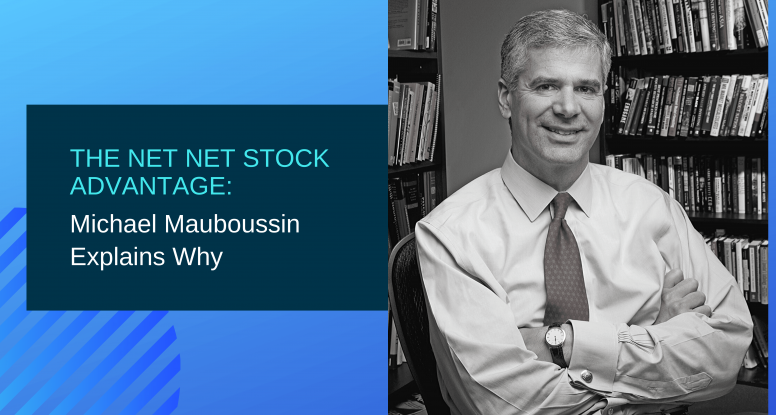The Net Net Stock Advantage: Here's Why
This article on Michael Mauboussin's market edge industry white paper was written by Net Net Hunter member Asymmetric. The article was sourced from a forum discussion on our Inner Circle Forum. For more information, click here.
Michael Mauboussin is one of the great thinkers on applying complexity theory to financial markets. In February he published a research paper title "Who is on the Other Side", analysing four different ways of gaining a market edge: Behavioural, Analytical, Informational, Technical, or BAIT. I want to go through each one and look at them through a net net lens.
Behavioural Market Edge
This is essentially being able to control your human impulses better than the other participants in the market -- the classical being greedy when others are fearful and vice versa.
Mauboussin writes, "Behavioral inefficiencies are likely the most enduring because human nature has not changed much over time and is unlikely to change much in the future." I would argue this is the key to a net net edge, buying stocks that the person on the other side of the trade is overly pessimistic on. As if to support this, Seth Klarman notes, “Value investing is at its core the marriage of a contrarian streak and a calculator.” The “contrarian” part demands an examination of the other side of the popular view. The “calculator” part ensures that valuation is sufficiently extreme to generate excess returns.
Analytical Market Edge
This refers to being able to see the same information as the other market participants, but being able to come to more accurate conclusions than them. There's a devide in the Net Net Hunter community between the more qualitatively focused investors, such as Evan, who feel they have an analytical advantage. And the quantitative buyers who don't feel any analytical edge and focus more on the mechanical "Ansan" approach to net net investing. This is dependent on the person and not so much on net nets vs. other stocks. However, since netnet firms are a lot smaller, a good analyst here has an advantage that they might not have in the biggest markets where you have to compete with the best of the best.
Informational Market Edge
Having an informational advantage includes illegal insider information, legal information gathering such as satellite views on foot traffic to malls etc. These are mostly irrelevant to us net net investors. However, one source of informational advantage comes from simply paying more attention to available information than your competition.
I actually feel at a disadvantage here in some markets, since a native Japanese speaker likely has more information on Japanese net net stocks and news than I do, simply because they can find and read things easily that I would struggle with. Due to home country bias, the person "on the other side" of the trade is also likely to be a native speaker for each stock.
Insiders have an informational (or analytic, the two are related) advantage, simply by understanding their business better than us. That's why following insider buys and buying stock based on it before others notice insiders are buying is often an informational advantage. Following insider buys and buying stock based on it while others notice the insider buying at the same time but don't value that information, would be an analytical advantage.
Technical Market Edge
You have a technical advantage if you can buy stocks that others are being forced to sell against their convictions. Margin calls, fund outflows, stocks going to small for indexes or mutual funds are all reasons someone might be forced to sell a stock.
At first I thought net net investors had a clear advantage here, since we can buy stocks too small for mutual funds etc. But that means that those funds are likely not "on the other side". So who is? Other deep value investors who've given up hope (either because they found something better, or because their holding period is up, or their thesis has changed), penny stock gamblers who dream of getting rich quick, company insiders either selling their own stock, firms diluting value by selling shares, and a few funds with a tiny amount of capital at work that can focus on tiny stocks.
You might even have a small technical advantage here over those few funds if they have to sell stocks that have gotten too small: a microcap stock that has crashed to become a net net nanocap might have to be purged from a microcap fund, giving us a technical advantage here.
Mauboussin's paper is a must read for any small investor and helps explain why net nets work out so well long term. I recommend reading the whole research paper. While it's 50 pages long, it includes 20 pages of endnotes, so there's 30 pages of gold.
Want to learn more? Join Net Net Hunter now and find high-quality net nets to stock your portfolio and boost your long-term returns. Enter your email address in the box below.






